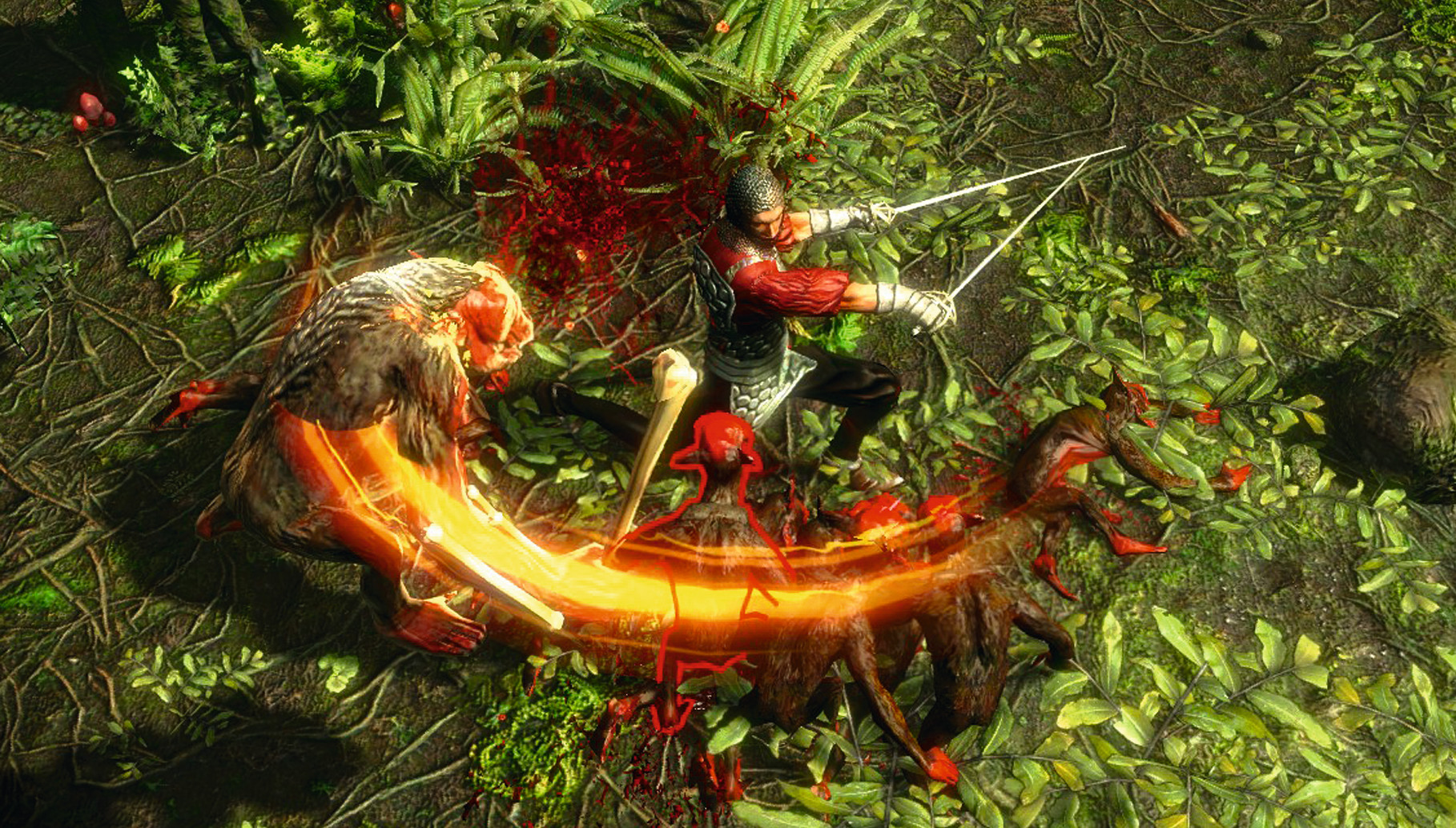Our Verdict
An exceptionally generous free-to-play action RPG. What it lacks in punch it makes up for in depth and value for money.
PC Gamer's got your back
Expect to pay free-to-play, £2 to £15 for cosmetic upgrades
Release Out now
Developer Grinding Gear Games
Publisher In-house
Multiplayer Up to 6, co-op
Link www.pathofexile.com
Path of Exile has changed significantly in the time since we published this review. Because of that, we've published a new review with up-to-date criticism. We've left this review here as a record of how we originally felt about Path of Exile.
Compulsion is a dubious sort of pleasure, but it's what action-RPGs excel at. With their slow levelling curves, gradually unlocking skills and swelling hordes of foes, Diablo, Titan Quest, Torchlight and now Path of Exile all aim to ensnare rather than instantly delight.
The 15-year-old formula has barely evolved, but is still effective. You must always start in rags, punching zombies with your bare fists in some gloomy town, because any grander beginning would curtail your slow ascent to godhood. A start anywhere more glamorous than a dark field or Path of Exile's grey beach would lessen the triumphant moment 12 hours later when you annihilate a 20-strong giant spider brood and think back to those first moments. Sometimes you'll find folk waiting beneath yellow exclamation marks to give you quests and deliver lore points in tiny boxes of text, but mostly you punch, loot, level up, equip your stolen gains, grow strong and slowly mould your bedraggled vagrant into a killing machine.
It's a character arc of sorts, albeit one plotted to the sound of a thousand repetitive mouse-clicks, but that comes with a quiet satisfaction of its own, a feeling of incremental achievement earned over many hours. If you value that feeling, Path of Exile is the 200-hour time sink you're looking for.
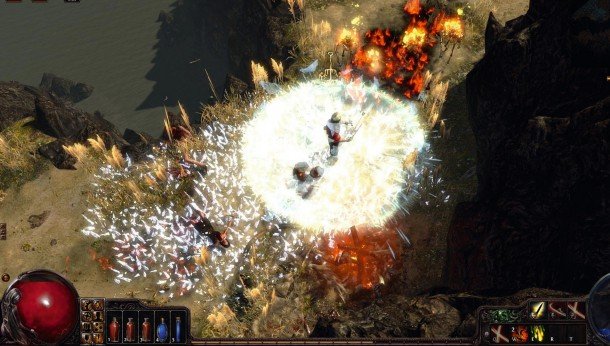
Your adventures take place on the cursed continent of Wraeclast. Each of the immediately playable character classes have been thrown out of their cushy homelands for various unimportant reasons, and must now carve out a new life for themselves, slicing up thousands of monsters in dark dungeons.
The game is free-to-play, and wonderfully generous with it. The microtransaction store is almost entirely stocked with cosmetic effects that make your weapons glow, or give your character new emotes. There are also a few convenience upgrades such as expanded item storage, which you won't need until you're very seriously invested in maxing out a few characters.
I mention this now because the game's granular skill system, which is based on a huge number of individual skill nodes, could so easily have been monetised to death. Grinding Gear Games should be commended for keeping their store separate from Path of Exile's integral game mechanics.
The Final Fantasy series serves as an unusual source of inspiration for this skill system. Levelling up gives you a point to spend on the levelling board: a vast and daunting maze of connected nodes, each representing a stat increase. You plot a course across this board by spending levelling points to ignite adjacent nodes. Powerful gold-encrusted variants are scattered here and there, offering major stat buffs that can help you specialise your character.
I spent most of my time levelling a Duellist, a dexterous but powerful rogue type. He's one of Path of Exile's seven classes, which also includes the magic-wielding Witch, the powerful Marauder, long-range specialist the Ranger, a Templar who's good at both whacking and zapping, a lithe assassin called The Shadow, and the Scion, an expert class that you have to play the game to unlock. Your class denotes your starting position on the levelling board, which positions you close to class-relevant buffs. Dexterity classes like the Duellist will have a short trip to dualwielding and bow nodes, while magical classes like The Witch start closer to magic-power bonuses.
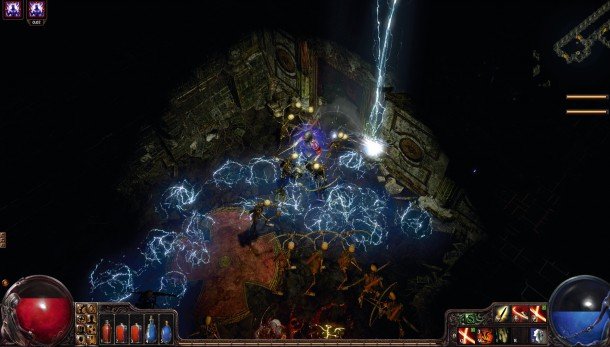
The Scion is challenging because she starts in the dead centre of the board, between all other classes, but that also means she can become a powerful hybrid of your own design once you know your way around.
The best thing about the board is that it links every class to every other class, which means I can eventually guide my Duellist into mage territory with enough levels. Plotting a path through all of your advances also provides a satisfying visualisation of your character's progress, though I'd like to feel the impact of that progress on the battlefield. Most nodes offer an incremental stat bonus that only slightly improves the efficiency of your slaughter. Every +10 dexterity buff I light up makes my hero hit ever-so-slightly faster, but I have to wait until I reach one of those golden nodes, with their plump 20% buffs, to enjoy noticeable knock-on.
It's a theorycrafter's paradise, however. The Path of Exile forums are overflowing with players peddling their latest character ideas. If you get bored of tailoring your own builds and want to fast track, you can sample the Duellist's 'Facebreaker build using Infernal and Dominating Blow', or go for an 'Explosive Arrow Marauder', or hundreds of others, each carefully turned over by other community members. Good knowledge of these builds is well rewarded by Path of Exile's extremely popular community races, which challenge participants to rush as far as possible through the game in a two-hour sprint. It's a clever way to generate a sense of cohesion among disparate adventurers, and encourages players to come up with inventive highspeed characters.
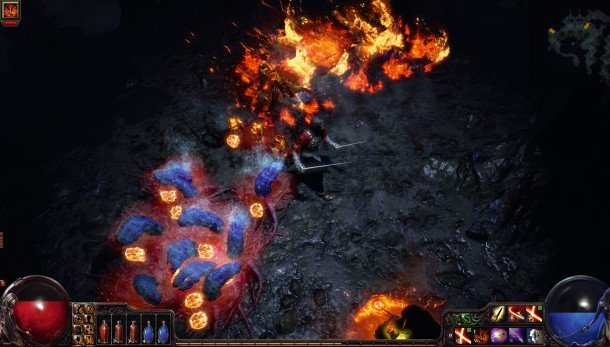
These extensive character development options are well supported by the skill system. Your character's abilities aren't unlocked on the levelling board, they take the form of skill gems that drop when you kill enemies and complete quests. You can use a skill in the field as long as you have the relevant gem slotted into your weapons or armour. Linked equipment slots enable you to use support gems to adjust your skills. For example, my Duellist's area-of-effect Cleave ability is in a slot connected to a support gem that infuses it with extra frost damage. These crystals gain levels along with you, becoming more powerful the longer you have them installed.
The formation of slots gouged into each piece of equipment is as important as the stat boosts they convey to your character, but these can be rearranged with one of Path of Exile's large selection of, wait for it, orbs. Orbs reshuffle the magical properties of an item, re-roll the number and formation of the slots it has and upgrade ordinary items to uncommon or rare ones. Orbs ensure that every piece of equipment that drops can potentially be useful to your build, and are the centrepiece of Path of Exile's barter economy. There is no money here. You exchange items for orb fragments that can combine to make functional item modifiers.
The cleverness behind this rethink of staid action-RPG systems extends to your health and mana potions. No longer must you hoard them in hundred-high stacks. Instead you carry five magical flasks that refill with every kill. Inevitably, these flasks can have magical properties of their own, which increase the amount of health regenerated and the speed at which it regenerates.
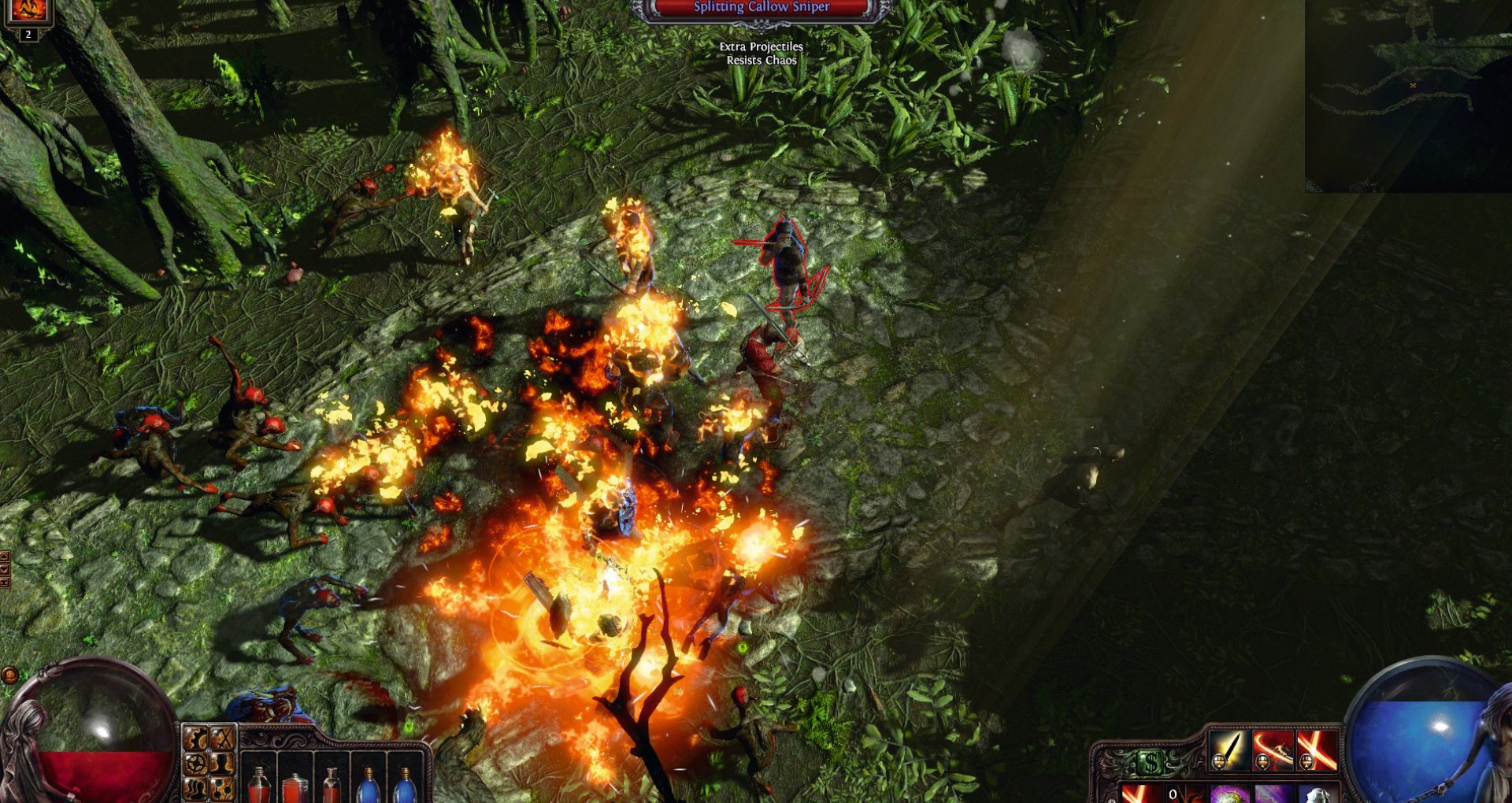
Beaten track
Path of Exile strives against the influence of its recent competitors. The muted locales and exquisite claustrophobia of its dungeons reject Torchlight's exuberant visuals. The intensive, detailed levelling options defy Diablo III's relatively straightforward choices. Path of Exile is well placed to capture gamers alienated by Blizzard's new direction, although like its controversial older brother it still requires an internet connection to play.
It also can't match the visual splendour and satisfying feedback of Diablo III. The combat improves after the first few hours when you start fighting large and varied swarms, but occasional lag and dsync issues can send your slashes right through monsters, and the varied and plentiful attacks lack the apocalyptic thwunk of PoE's big-budget competitor. That might be because the engine lacks the physics capabilities to render responsive ragdolls. It's still entertaining to wade through PoE's larger mobs, but the combat isn't quite best-in-class.
The plain fields and character models look a little dated, and the gear design stays firmly within the boundaries of Path of Exile's grimy medieval aesthetic. That suits the game's deliberate lack of glamour, but limits the tactile pleasure of equipping ridiculously powerful kit. Extraordinary gear doesn't look extraordinary here, but for those already put off by Blizzard's famously enormous spiked pauldrons, that won't be a bad thing.
If you play action-RPGs as a cathartic power trip, to slam into monstrous hordes and watch their bloody bodies ragdoll across the scenery, then Path of Exile will seem dry. It's not a game about instant gratification, it's about slowly forging an inventive character over three acts and three difficulty tiers. Once it has its claws in, Path of Exile is as compulsive as any other in the genre. After a few hours the combat becomes automatic. The objectives are moot, the quests, characters and creatures incidental. Every stab and slash is in service of the real journey across that vast levelling board. Every 500 to 1,000 clicks lights up another node, and the little warrior mannequin takes another step away from being a template and toward something that's uniquely yours.
An exceptionally generous free-to-play action RPG. What it lacks in punch it makes up for in depth and value for money.
Part of the UK team, Tom was with PC Gamer at the very beginning of the website's launch—first as a news writer, and then as online editor until his departure in 2020. His specialties are strategy games, action RPGs, hack ‘n slash games, digital card games… basically anything that he can fit on a hard drive. His final boss form is Deckard Cain.
